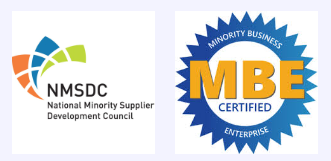State & Local Level Registrations
State & Local Level Registrations
State & Local Level Registrations
MBE
MBE Certification is a state-level registration that designates your business as being
at least 51% owned, operated, and controlled by an ‘ethnic minority’ individual(s).
The purpose of the MBE Certification is to provide opportunities for minority-owned businesses
to access government contracts and expand their presence in the marketplace.
MBE
MBE Certification is a state-level registration that designates your business as being
at least 51% owned, operated, and controlled by an ‘ethnic minority’ individual(s).
The purpose of the MBE Certification is to provide opportunities for minority-owned businesses
to access government contracts and expand their presence in the marketplace.
MBE
MBE Certification is a state-level registration that designates your business as being
at least 51% owned, operated, and controlled by an ‘ethnic minority’ individual(s).
The purpose of the MBE Certification is to provide opportunities for minority-owned businesses
to access government contracts and expand their presence in the marketplace.
MBE Certification Benefits
MBE Certification makes your business more appealing to State, Local, and Municipal agencies. In addition, large corporations typically have supplier diversity programs to ensure that a percentage of their budgets are used to buy products/services from MBE Certified businesses.

MBE Certification Benefits
MBE Certification makes your business more appealing to State, Local, and Municipal agencies. In addition, large corporations typically have supplier diversity programs to ensure that a percentage of their budgets are used to buy products/services from MBE Certified businesses.


MBE Certification Benefits
MBE Certification makes your business more appealing to State, Local, and Municipal agencies. In addition, large corporations typically have supplier diversity programs to ensure that a percentage of their budgets are used to buy products/services from MBE Certified businesses.
-
Access to Contract Opportunities
Access to government and private sector contracts that are specifically set aside for minority-owned businesses. This can open doors to new business and revenue streams that may not have been available otherwise.
-
Competitive Edge
Gives you a competitive edge when bidding for contracts, as it demonstrates that you meet certain standards and criteria, making you a preferred choice among buyers.
-
Building Block for Federal Contracting
The MBE Certification offers more accessible qualification criteria than federal certifications making it ideal for businesses that do not yet meet these requirements, as well as gain contracting performance history.
-
Networking Opportunities
Provides opportunities to connect with other minority-owned businesses and potential clients through various events and networking opportunities. This can help you build new relationships and network with industry contacts.
-
Access to Funding and Resources
Access to funding and resources, such as loans, grants, purchasing networks, and training programs, which can help your business grow and succeed.
-
Improved Credibility
Improve the credibility of your business, as it demonstrates that you have been independently verified as minority-owned and meet certain standards, instilling trust and confidence among clients and partners.
-
Access to Contract Opportunities
Access to government and private sector contracts that are specifically set aside for minority-owned businesses. This can open doors to new business and revenue streams that may not have been available otherwise.
-
Competitive Edge
Gives you a competitive edge when bidding for contracts, as it demonstrates that you meet certain standards and criteria, making you a preferred choice among buyers.
-
Building Block for Federal Contracting
The MBE Certification offers more accessible qualification criteria than federal certifications making it ideal for businesses that do not yet meet these requirements, as well as gain contracting performance history.
-
Networking Opportunities
Provides opportunities to connect with other minority-owned businesses and potential clients through various events and networking opportunities. This can help you build new relationships and network with industry contacts.
-
Access to Funding and Resources
Access to funding and resources, such as loans, grants, purchasing networks, and training programs, which can help your business grow and succeed.
-
Improved Credibility
Improve the credibility of your business, as it demonstrates that you have been independently verified as minority-owned and meet certain standards, instilling trust and confidence among clients and partners.
-
Access to Contract Opportunities
Access to government and private sector contracts that are specifically set aside for minority-owned businesses. This can open doors to new business and revenue streams that may not have been available otherwise.
-
Competitive Edge
Gives you a competitive edge when bidding for contracts, as it demonstrates that you meet certain standards and criteria, making you a preferred choice among buyers.
-
Building Block for Federal Contracting
The MBE Certification offers more accessible qualification criteria than federal certifications making it ideal for businesses that do not yet meet these requirements, as well as gain contracting performance history.
-
Networking Opportunities
Provides opportunities to connect with other minority-owned businesses and potential clients through various events and networking opportunities. This can help you build new relationships and network with industry contacts.
-
Access to Funding and Resources
Access to funding and resources, such as loans, grants, purchasing networks, and training programs, which can help your business grow and succeed.
-
Improved Credibility
Improve the credibility of your business, as it demonstrates that you have been independently verified as minority-owned and meet certain standards, instilling trust and confidence among clients and partners.
MBE Eligibility
MBE Eligibility
Qualification Criteria to be a MBE Certified Small Business with the National Minority Supplier Development Council (NMSDC):
-
51% owned, operated, and controlled by a member(s) of an 'ethnic minority' group who is at least 25% African-American, Hispanic-American, Asian-American, Pacific Islander, or Native American.
-
The top executive officer responsible for managing the daily operations has experience in the business’s field of endeavor, and must be a minority and primary owner of the business spending at least 40 hours per week at the business.


MBE Eligibility
MBE Eligibility
Qualification Criteria to be a MBE Certified Small Business with the National Minority Supplier Development Council (NMSDC):
-
51% owned, operated, and controlled by a member(s) of an 'ethnic minority' group who is at least 25% African-American, Hispanic-American, Asian-American, Pacific Islander, or Native American.
-
The top executive officer responsible for managing the daily operations has experience in the business’s field of endeavor, and must be a minority and primary owner of the business spending at least 40 hours per week at the business.




MBE Eligibility
MBE Eligibility
Qualification Criteria to be a MBE Certified Small Business with the National Minority Supplier Development Council (NMSDC):
-
51% owned, operated, and controlled by a member(s) of an 'ethnic minority' group who is at least 25% African-American, Hispanic-American, Asian-American, Pacific Islander, or Native American.
-
The top executive officer responsible for managing the daily operations has experience in the business’s field of endeavor, and must be a minority and primary owner of the business spending at least 40 hours per week at the business.
